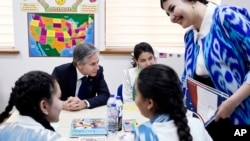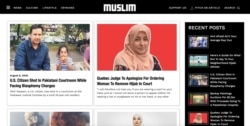Student Union
- By Megan Hatch
Young Muslims Challenge Traditional Stereotypes

Young Muslims like Humaira Akram are using social media to show the Islamic culture’s younger side.
“Gen Z Muslims have changed or progressed Muslim culture in today’s society by being more vocal, using their social media platforms to advocate for justice and being open-minded,” said Akram, a student at Brooklyn College in New York.
Akram and others say they think many non-Muslims see violence and sexism as stereotypes. But younger Muslims are eager to move beyond that, she said.
“They are eager to learn and succeed, while speaking up against misconceptions and raising awareness for future generations, speaking up against injustice, and using their voice to make a change,” Akram said.
The conservative religious regimes in Iran and Saudi Arabia compel women to wear head coverings and keep them subservient to men. In other Islamic countries such as Afghanistan, head covering is a cultural practice rather than mandated by law.
Other Muslim-majority countries such as Indonesia, Turkey and Syria, have made greater strides in women’s rights, with more women attending university and holding senior government positions. Afghanistan's parliament, according to Human Rights Watch, "has a higher percentage of women than does the U.S. Congress."
And in a world that has doubled its population since 1960, the largest Islamic country — Indonesia — cut its fertility rate by half after the government promoted the use of birth control. Indonesia is among the four largest nations in the world after China, India and the United States.
Clearing up misconceptions
According to the website Teaching Tolerance, stereotypes and misconceptions about Muslims include extreme sexism and violence.
Social media influencers Zahra Hashimee and Sabina Hanan use TikTok and YouTube to bring attention to the Muslim culture and address these misconceptions.
Hashimee shares with viewers why she wears a hijab and how she gets her hair cut. She also explains the holy month of Ramadan in 60 seconds.
Hanan answers users’ comments and questions about Islam and the Muslim culture, and posts positive messages on Instagram in Arabic.
Public office and activism
Young Muslims have also seen new representation in government positions.
Last year at age 21, Bushra Amiwala was elected to the Skokie School District 73.5 Board of Education in Illinois when she was only a junior at DePaul University. She is one of the youngest Muslim elected officials in the United States.
The U.S. also saw its first two Muslim congresswomen in 2019 —Ilhan Omar from Minnesota and Rashida Tlaib from Michigan.
In a recent poll, 90% of members of Generation Z overall support the Black Lives Matter (BLM) movement and worldwide protests against racism, according to Business Insider. Gen Z'ers are also more progressive than earlier generations, according to a Pew Research study.
BLM is a decentralized movement protesting against incidents of police brutality and racially motivated violence against Black people, according to Black Lives Matter.com.
Muslims constitute 1% of the U.S. population, and at least 42% are under 30, categorized as Gen Z and millennials, according to the Public Religion Research Institute.
“During this time of change as the Black Lives Matter movement treads on, it is extremely important for Gen Z Muslims to speak up against injustice and use their voice to make a change,” Akram said.
Isha Fazili, a student at New York University, said she looks up to Gen Z Muslims like Riz Ahmed, a British Pakistani Muslim actor, rapper, and activist, who has an Emmy Award for his role in the HBO series “The Night Of” and has performed in front of sold-out crowds at Coachella and Webster Hall, two popular music events.
“We challenge the idea that Muslims are a monolith. We defy stereotypes and seek to remedy issues such as racism and colorism within our communities. We are fashionable, charitable, intelligent, talented, passionate,” Fazili said.
Other Gen Z Muslims like Ameer Al-Khatahtbeh have created an online platform for other Gen Z Muslims. Al-Khatahtbeh is the founder of Muslim.co, a new digital publication for Gen Z Muslims within the ummah — a community of Muslims brought together regardless of race, gender, sect or practice of their faith.
Gen Z'er Haniah Ahmed studies at the University of Ontario Institute of Technology in Canada and said she believes Gen Z Muslims celebrate the culture in a way that is more liberating and accepting.
“Gen Z Muslims have been able to tie together Muslim and non-Muslim culture, like Western ideals and Muslim ideals, without sacrificing their beliefs, making Islam more approachable and relatable,” Ahmed said. “Gen Z Muslims, for example, have tied together the rights of women that the Quran has stated and Western feminism to make Islam more understandable and approachable and relatable."
She added, “Gen Z Muslims have also changed Islamic culture to become more liberal in such a way that Muslims are now proud to express themselves in whatever way they see fit, especially in ways that are directly tied to the arts and music sectors.”
Love and marriage
Traditional Islam has encouraged Muslims to marry within their faith. Younger Muslims are changing this, said Hanna El-Mohandess, a Gen Z Muslim studying at Emerson College.
“Nowadays, there are many Muslim women who are with guys who aren't Muslim, because a lot of those circumstantial rulings, like arranged marriages and marriage laws, no longer exist,” she said.
Imran Muthuvappa, a Gen Z Muslim student at the University of Albany, said the internet has allowed other younger Muslims to become stricter in their faith.
“In my own personal circle, a lot of people are becoming even more strict about their faith due to the fact that they now have support systems through the internet. I feel that with a lot of the people that I surround myself with, they have progressively felt less pressured to conform to Western standards,” Muthuvappa said.
Ahmed said changing minds over a generation takes time.
“I believe the actual Muslim faith and belief system has not changed. But the individuals who previously made the belief system come across as limiting and unaccepting and are being slowly pushed aside,” Ahmed said.
“Gen Z Muslims with progressive views of Islam are starting to take a stand in leading the Muslim youth by understanding that religion is an extremely unique path for every person,” said Ahmed. “Something which their ancestors did not understand, as they thought religion is extremely black and white.”
See all News Updates of the Day
- By VOA News
Michigan State international students get their own space

Michigan State University in East Lansing, Michigan, is setting aside a space in the International Center for international students.
Nidal Dajani, vice president of the school's International Student Association, said that the club plans to use the space to host events and hopes to collaborate with other student groups.
- By Dylan Ebs
International students find community during Pride Month

For LGBTQ+ international students, Pride Month, observed in June, is a unique time to reflect.
They hold on to multiple identities — both their LGBTQ+ identity and their cultural background — but coming to terms with them is not always easy.
For graduate student David Zhou, these identities can feel conflicting as transgender rights in China remain a controversial issue and spaces for LGBTQ people close. Zhou, 25, is transgender and pursuing an education in the STEM field at an urban university in the Midwestern United States.
VOA is using a pseudonym for Zhou’s first name and is not naming his university to protect his identity due to safety concerns back home in China. Zhou is not open about his transgender identity to his family.
During Pride Month, Zhou said he attended multiple LGBTQ+ events in his community and is surrounded by a supportive group of LGBTQ+ students who can relate to his experiences. But he’s not open about his identity to everyone on campus and said he doesn’t disclose his preferred pronouns to everyone to avoid transphobic comments.
“I feel like I have to make some judgments of the character of that person to see if they’re a good person to disclose [my identity] to,” Zhou said.
Zhou’s Pride Month celebrations included attending local markets with LGBTQ+ vendors and hanging out with his LGBTQ+ friends.
“They normalized being trans and for a long time I feel like trans identity is, should I say a vulnerability, brings me fear and worrying about discrimination, but having those events are helpful because it allowed me to see that queer people could just [live] openly,” he said.
At social events where few international students are present, Zhou said it can be tough to fit in.
“There's a lot of times like when they were talking about things I kind of, don't really understand, mostly because I kind of lack some background experience or knowledge,” he said.
Zhou said he is not aware of specific groups for LGBTQ+ international students at his university, but said international students are more prevalent in graduate programs and therefore find representation in organizations for LGBTQ+ graduate students.
In China, transgender individuals must obtain consent from an “immediate family member,” even for adults hoping to transition, which critics say limits the autonomy of transgender individuals while supporters say the policy protects doctors from violence by upset parents.
Struby Struble, a former coordinator of the University of Missouri LGBTQ+ Resource Center, told NAFSA: Association of International Educators in 2015 that LGBTQ+ international students face a “double barrier” on campus.
“With their international student friends, they feel isolated because they’re the LGBT one,” she said. “But then among the LGBT students on campus, they feel isolated because they’re the international one.”
Nick Martin, associate director of the Q Center, Binghamton University’s LGBTQ+ student support office, said when international students tour the center, there’s often a sense of hesitation as they enter a type of space that may not be present in their home country.
“I compare that to a year in after they've come into the space, they've again, maybe come to some of our events, they've got more connected,” he said.
Martin said graduate students have a unique interest in the Q Center as they may use the office for research and advocacy purposes that align with their studies.
“For older students, there may be hesitancy in a different way, but I think it's more in the vein of they want to do some of the advocacy work,” he said.
Martin said he thinks about how both his office and BU’s international student office can support students who come from countries with few — if any — protections for LGBTQ+ individuals.
“It's been a learning process of what those students really need, but I think I've kind of learned that a lot of students are just looking for the safe space that we offer,” Martin said.
- By VOA News
International students discuss US campus culture shock

International students at De Anza College in Cupertino, California, talked about culture shock in an article in La Voz News, the student newspaper.
"It felt like a major culture shock. Everything was so different, from academics to mannerism," said a student from Mexico.
Read the full story here.
These are the most expensive schools in the US

High tuition costs along with housing and food expenses can add up for students at U.S. colleges and universities.
MSNBC looked at the most expensive schools in the country, with one costing more than $500,000 for a bachelor’s degree. (June 2024)
Uzbekistan students admitted into top US universities

Students from Uzbekistan are among the international students admitted to top colleges and universities in recent years.
Gazata.uz profiled some of the Uzbekistan students attending Harvard, Brown, Princeton and other U.S. universities. (June 2024)








